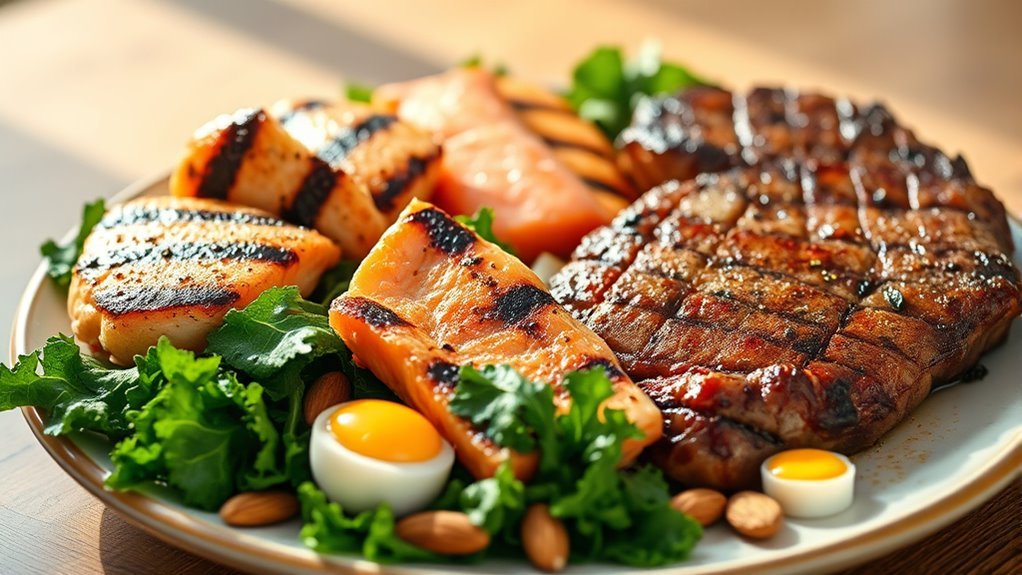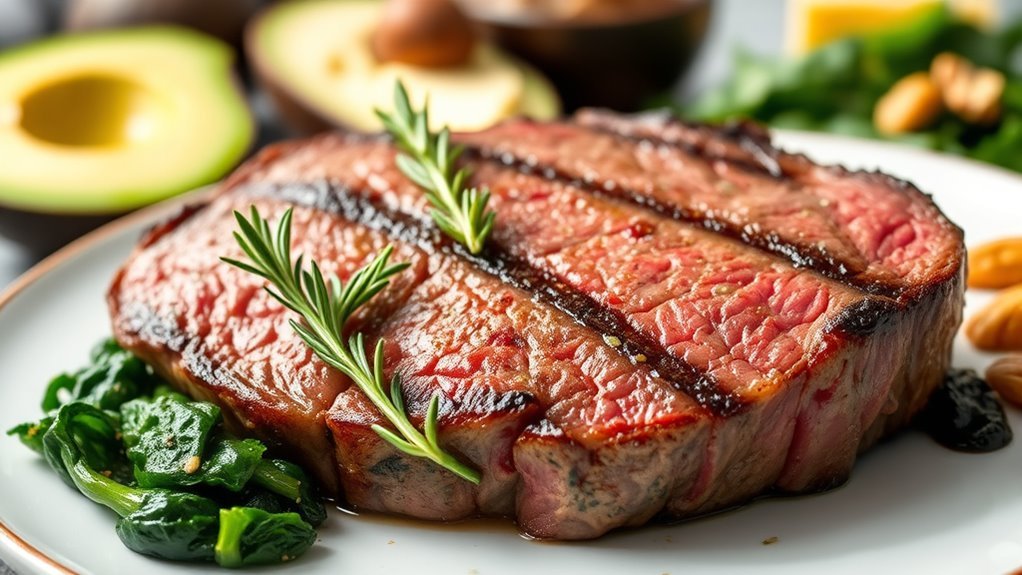On a ketogenic diet, you should aim for protein to make up about 20-25% of your total daily calories. This level helps preserve muscle mass while keeping you in ketosis and supports overall health. Balancing your protein intake is crucial for ensuring you don’t experience fatigue or muscle loss. Adjusting your protein based on your activity level and goals is essential for success. Keep exploring to discover more valuable insights on optimizing your keto journey.
Understanding the Ketogenic Diet

As you explore the ketogenic diet, you’ll find it’s more than just a low-carb eating plan; it’s a metabolic shift that encourages your body to burn fat for fuel instead of carbohydrates. One common keto misconception is that it’s simply about eating less carbs. In reality, it’s about embracing a new way of fueling your body sustainably. You’ll want to focus on high-quality fats, moderate protein, and minimal carbs, which can enhance your energy and mental clarity. This diet isn’t just a temporary fix; it can be a long-term lifestyle choice when done right. Understanding the balance and sustainability of your food choices is key. With the right approach, you can enjoy freedom in your eating habits, feeling satisfied and nourished.
Macronutrient Breakdown of Keto

Understanding the macronutrient breakdown of the ketogenic diet is key to successfully adopting this lifestyle. Typically, a standard keto diet comprises about 70-75% fats, 20-25% protein, and 5-10% carbohydrates. However, it’s important to take into account protein quality and how it fits into different keto variations. You might choose a higher protein version, especially if you’re active, while others may prefer a more traditional approach. Quality matters—opt for lean meats, fish, eggs, and plant-based proteins that nourish your body. Balancing your macros not only supports ketosis but also helps you feel satisfied and energized. With this knowledge, you can customize your keto journey, embracing the freedom to create a plan that works best for you.
The Role of Protein in Ketosis

While the primary focus of the ketogenic diet is on high fat intake, protein plays an essential role in maintaining muscle mass and supporting overall health. Adequate protein intake helps promote protein synthesis, which is vital for muscle preservation, especially when you’re restricting carbohydrates. As you enter ketosis, your body shifts to using fat for fuel, but without enough protein, you risk losing muscle. This is where the balance comes in—ensuring you’re consuming enough protein allows you to enjoy the freedom of the keto lifestyle without sacrificing your strength or fitness goals. By prioritizing protein, you not only support your body’s needs but also enhance your overall wellbeing while enjoying the benefits of a ketogenic approach.
Recommended Protein Intake for Keto
When following a ketogenic diet, aiming for a protein intake of about 20-25% of your total daily calories is generally recommended. This range helps preserve muscle mass while keeping you in ketosis. It’s important to take into account protein timing, too; consuming protein evenly throughout the day can enhance muscle recovery and satiety. Focus on high-quality protein types, like lean meats, fish, eggs, and plant-based sources, to guarantee you’re getting essential amino acids. Balancing your protein intake with fats will help you maintain energy levels and feel satisfied. By customizing your protein consumption and timing, you can enjoy the freedom of choosing delicious foods while still achieving your keto goals.
Factors Influencing Protein Needs
Your protein needs on a keto diet can vary greatly based on your activity level and body composition. If you’re more active or have a higher muscle mass, you might require more protein to support recovery and growth. Understanding these factors can help you tailor your intake for best results.
Activity Level
Understanding your activity level is vital in determining your protein needs on a keto diet, as it directly affects how much protein your body requires for ideal performance and recovery. If you’re engaging in high exercise intensity, your muscles demand more protein for repair and growth. This increased need can vary considerably based on whether you’re lifting weights, doing cardio, or practicing high-intensity interval training. Conversely, if your activity level is low, your protein needs may decrease. It’s essential to match your protein intake with your activity to promote best muscle recovery and maintain energy levels. Finding that balance allows you the freedom to enjoy your keto journey while supporting your overall health and fitness goals.
Body Composition
Body composition plays an essential role in determining your protein needs on a keto diet. If you’re focused on muscle preservation while pursuing fat loss, tailoring your protein intake is vital. Generally, those with a higher muscle mass may require more protein to maintain that muscle during a caloric deficit. This helps prevent muscle breakdown and supports your overall metabolic function. On the other hand, if you have a higher body fat percentage, your protein needs might be slightly lower, yet still important for maintaining lean mass. Ultimately, listening to your body and adjusting your protein intake based on your unique composition can empower you to achieve your goals while enjoying the freedom of the keto lifestyle.
Choosing the Right Protein Sources
When it comes to the keto diet, selecting the right protein sources is crucial for maintaining ketosis while ensuring you get all the essential nutrients. Focus on lean meats like chicken and turkey, as they’re high in protein quality and low in carbs. Don’t overlook seafood options, which are packed with omega-3 fatty acids. If you prefer plant proteins, consider options like tofu and tempeh, but monitor their carb content. Dairy choices, such as Greek yogurt and cheese, can add variety and nutrient density to your meals. Timing your protein intake is important too, especially when meal planning. If you need a boost, protein supplements like whey or plant-based powders can help meet your needs without compromising your keto goals.
Balancing Protein With Fats and Carbs
While balancing protein with fats and carbs on a keto diet, it’s crucial to maintain the right ratios to support your health goals. Aim for about 20-25% of your daily intake from protein, focusing on high-quality sources like grass-fed meats and wild-caught fish. This guarantees you’re meeting your body’s needs while still enjoying the freedom that a keto lifestyle offers. Consider protein timing; spreading your protein consumption throughout the day can enhance muscle synthesis and keep you feeling satisfied. Don’t forget to adjust your fat intake to compensate for the protein, ensuring it makes up roughly 70-75% of your diet. This equilibrium allows you to thrive while sticking to your keto journey.
Signs of Inadequate Protein Consumption
Noticing three key signs can indicate inadequate protein consumption on a keto diet. First, if you’re experiencing unexplained fatigue, it might be a sign of protein deficiency. Your body needs protein to maintain energy levels, and without it, you’ll likely feel drained. Second, watch for muscle loss. If you find it harder to recover from workouts or notice a decrease in muscle mass, your protein intake may not be sufficient. Finally, look out for cravings. Increased hunger can signal that your body is lacking the necessary nutrients, including protein. Listening to these signs can empower you to adjust your intake and maintain your health and wellbeing on the keto journey.
Adjusting Protein Intake for Individual Goals
To effectively adjust your protein intake on a keto diet, you’ll need to assess your personal goals, such as weight loss or muscle gain. Your activity level and body composition also play vital roles in determining how much protein you should consume. By considering these factors, you can tailor your protein intake to better align with your individual needs.
Personal Goals Assessment
How can you effectively tailor your protein intake to meet your personal health goals on a keto diet? Start by evaluating your personal motivation—are you aiming for weight loss, muscle gain, or overall wellness? Each goal requires a different approach to protein consumption. For instance, if you’re focused on muscle gain, you might need a higher protein percentage to support growth and recovery. Conversely, if weight loss is your priority, moderate protein may help maintain muscle while promoting fat loss. Consider your dietary preferences too; choose protein sources that you enjoy and can sustain long-term. By aligning your protein intake with your goals and preferences, you’ll enjoy a more fulfilling and successful keto experience.
Activity Level Considerations
While your activity level plays an essential role in determining your protein needs on a keto diet, understanding how to adjust your intake can optimize your results. If you engage in high exercise intensity, you might require more protein to support muscle repair and growth. This isn’t just about building muscle; it’s also vital for meeting your recovery needs. On the flip side, if your activity level is moderate or low, you can dial back your protein without sacrificing results. Listen to your body and adjust accordingly—this flexibility is key to achieving your personal goals. By tailoring your protein intake to match your lifestyle, you can enjoy the freedom of the keto diet while still fueling your performance effectively.
Body Composition Factors
Body composition plays an essential role in determining your ideal protein intake on a keto diet. If you’re focused on muscle preservation, you’ll want to make sure your protein intake supports your goals. Generally, a higher protein percentage can help maintain lean muscle mass while promoting fat loss, especially if you’re active. For those aiming for weight management, adjusting your protein levels according to your body’s needs can be key. If you’re losing weight, you might need more protein to protect against muscle loss. Remember, each person’s needs vary, so listen to your body and consider consulting a nutrition expert. Finding that balance will give you the freedom to enjoy your keto journey while achieving your desired results.
What is the ideal percentage of protein in a keto diet?
The ideal percentage of protein in a keto diet typically ranges from 20% to 25% of your total daily caloric intake. The primary focus of the keto diet is on high fat intake, generally around 70% to 75%, with carbohydrates being kept very low, usually around 5% to 10%. This balance helps maintain ketosis, where your body burns fat for fuel instead of carbohydrates.
Can I consume too much protein on a keto diet?
Yes, consuming too much protein on a keto diet can potentially kick you out of ketosis. When protein intake is excessively high, your body may convert the excess protein into glucose through a process called gluconeogenesis. To stay in ketosis, it’s important to monitor your protein intake and ensure it aligns with the recommended percentage of your total caloric intake.
What types of protein are best for a keto diet?
For a keto diet, it’s best to focus on high-quality, nutrient-dense protein sources. These include fatty cuts of meat, such as ribeye or pork belly, fish rich in omega-3 fatty acids like salmon, eggs, and full-fat dairy products. Additionally, plant-based proteins like tofu and tempeh can be included, but they should be consumed in moderation due to their carbohydrate content.
How does protein intake affect weight loss on a keto diet?
Protein plays a crucial role in weight loss on a keto diet as it helps to promote satiety, reducing overall calorie intake. Additionally, protein has a higher thermic effect than fats and carbohydrates, meaning your body burns more calories digesting it. However, it’s important to maintain a balance to ensure that protein does not exceed the recommended percentage to keep your body in a state of ketosis.
Is there a difference in protein needs for active individuals on keto?
Yes, active individuals may have slightly higher protein needs due to increased muscle repair and recovery. While the standard recommendation is to keep protein intake between 20-25%, those engaging in regular intense exercise may benefit from increasing their protein percentage to around 25-30%. However, it is essential to adjust this intake carefully to avoid exceeding limits that could disrupt ketosis.
References
- https://www.ncbi.nlm.nih.gov/pmc/articles/PMC6461181/
- https://www.healthline.com/nutrition/keto-diet-101
- https://www.cdc.gov/healthyweight/assessing/bmi/adult_bmi/index.html
- https://www.dietitians.ca/Downloads/Public/Understanding-the-Keto-Diet.aspx
- https://www.mayoclinic.org/healthy-lifestyle/nutrition-and-healthy-eating/expert-answers/keto-diet/faq-20457243
- https://www.webmd.com/diet/what-is-the-keto-diet
- https://www.bbc.com/news/health-54003599


